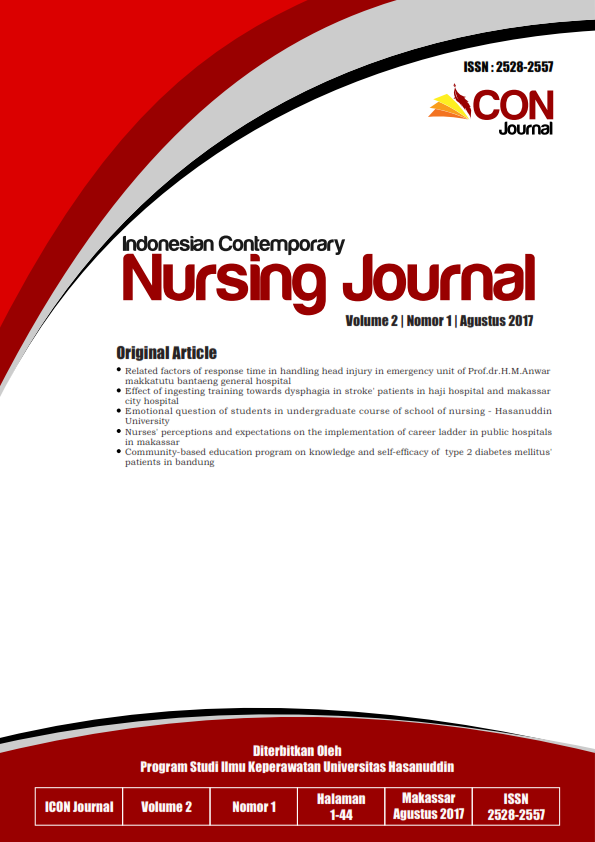Emotional Question of Students in Undergraduate Course of School of Nursing Hasanuddin University
DOI:
https://doi.org/10.20956/icon.v2i1.3581Abstract
Introduction: Lower level of caring in Indonesian nurses related to emotionalintelligence level of nursing, and assertion to nurses for always being professional in any
circumstances and this condition relatated to emotional intelligence which is formed when
undergoing nursing education along emotional intelligence phenomena in nurses period of
education and period of profession education between regular students
and non-regular students. Method: the design of this study is descriptive research with crossectional approach. Sample selection technique using disproportionate stratified random sampling, with the number of respondent about 128 respondents. Primary data was obtained through a TEIQUE questionnaire in the form of question about Emotional Itelligence and the ability of recognizing emotion, managing emotion, self motivation, empathy, social skill
Result: This study shows that, 55 % respondents have a high emotional intelligence and higer in term of recognizing emotion ability (80.5 %), managing emotion ability (56.3 %), self motivation ability (92.2 %), empathy ability (59.4 %), and social skill ability (63.3 %). Respondent characteristics who have higer in emotional intelligence were from adults (56.4 %), woman (56.4 %), unreguler students (96.4 %), widow/widowed marriage status (69.2 %),
student who do not entered any organization (76.1 %), and students in
seventh grade (69.4 %).Conclusion: : the result showed that more than half respondents have higer emotional intelligence (managing emotion ability, self motivation ability, empathy ability, social skill ability ) so that give us information about description of Emotional Intelligence in Undergraduate Hasanuddin University Nursing Students.
References
Introduction: Lower level of caring in Indonesian nurses related to emotional
intelligence level of nursing, and assertion to nurses for always being professional in any
circumstances and this condition relatated to emotional intelligence which is formed when
undergoing nursing education along emotional intelligence phenomena in nurses period of
education and period of profession education between regular students
and non-regular students. Method: the design of this study is descriptive research with crossectional approach. Sample selection technique using disproportionate stratified random sampling, with the number of respondent about 128 respondents. Primary data was obtained through a TEIQUE questionnaire in the form of question about Emotional Itelligence and the ability of recognizing emotion, managing emotion, self motivation, empathy, social skill
Result: This study shows that, 55 % respondents have a high emotional intelligence and higer in term of recognizing emotion ability (80.5 %), managing emotion ability (56.3 %), self motivation ability (92.2 %), empathy ability (59.4 %), and social skill ability (63.3 %). Respondent characteristics who have higer in emotional intelligence were from adults (56.4 %), woman (56.4 %), unreguler students (96.4 %), widow/widowed marriage status (69.2 %),
student who do not entered any organization (76.1 %), and students in
seventh grade (69.4 %).Conclusion: : the result showed that more than half respondents have higer emotional intelligence (managing emotion ability, self motivation ability, empathy ability, social skill ability ) so that give us information about description of Emotional Intelligence in Undergraduate Hasanuddin University Nursing Students.
Downloads
Published
How to Cite
Issue
Section
License
Authors who publish with this journal agree to the following terms:Authors retain copyright and grant the journal right of first publication with the work simultaneously licensed under a Creative Commons Attribution License that allows others to share the work with an acknowledgement of the work's authorship and initial publication in this journal.
Authors are able to enter into separate, additional contractual arrangements for the non-exclusive distribution of the journal's published version of the work (e.g., post it to an institutional repository or publish it in a book), with an acknowledgement of its initial publication in this journal.
Authors are permitted and encouraged to post their work online (e.g., in institutional repositories or on their website) prior to and during the submission process, as it can lead to productive exchanges, as well as earlier and greater citation of published work (See The Effect of Open Access).
Accepted 2018-02-13
Published 2017-08-30



